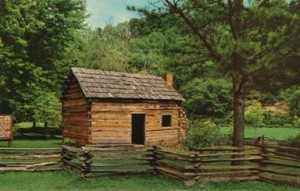We stand on the verge of debating the next Farm Bill. It’s unclear to me where the leadership will come from to craft this next round of agricultural policy. With February upon us I thought now might be a good time to reflect on the history of America’s early national leaders and their views on agriculture. I thought I’d start with the two Presidents whose birthdays we celebrate this month. So, let’s take a look at our first President.
“I had rather be on my farm than be emperor of the world”
“I know of no pursuit in which more real and important services can be rendered to any country than by improving its agriculture, its breed of useful animals, and other branches of a husbandman’s cares.” – George Washington
Washington was clearly a man who loved his farm. Perhaps, he loved it more than being president! He had led a nation in wartime, at its founding. One could argue that the Revolution was mostly about commerce and agriculture. In fact, to a large degree, commerce and agriculture were one in the same in those days. At the beginning of our nation America’s place in the world was based on our rapidly expanding agricultural productivity and trade. Our ability to freely trade those products and gain access to world finances based on our sale of agricultural products was the basis for our growth and prosperity. Washington, as evidenced by his second quote, was aware that agricultural improvements were, in fact, strategically important to his new nation. Are these facts so different than what we see in today’s world?
Today, in the midst of a world-wide economic malaise that continues to hobble the U.S. economy, agriculture has been a bright spot. Our balance of trade is defined by agricultural sales which offset declines in other sectors. But access to markets in Asia, and elsewhere, are still constrained by imbalances in tariffs and trading rules. Today, agriculture is one of America’s strategic strong points in international affairs. More than ever, agricultural technologies from the U.S. dominate world farming practices. But will the next Farm Bill recognize and capitalize on those advantages? Will our leaders recognize the importance of research and development, as Washington evidently did? Will we, for the first time, truly seize the opportunities to permanently preserve our inestimable reserves of prime working lands, farms and forests? Washington would urge us to do more than we have done – for the sake of our nation! Now, I turn to Abraham Lincoln.
This leads to the further reflection, that no other human occupation opens so wide a field for the profitable and agreeable combination of labor with cultivated thought, as agriculture. I know of nothing so pleasant to the mind, as the discovery of anything which is at once new and valuable — nothing which so lightens and sweetens toil, as the hopeful pursuit of such discovery. And how vast, and how varied a field is agriculture, for such discovery. The mind, already trained to thought, in the country school, or higher school, cannot fail to find there an exhaustless source of profitable enjoyment.
–AbrahamLincoln, Address before the Wisconsin State Agricultural Society, September 30, 1859
Putting aside the language of the 19th century, Lincoln’s words sound so fresh and alive to me! Lincoln, the creator of the United States Department of Agriculture, the signer of the Homestead Act and the Morrill Act, was a man with a keen sense of the importance of taking the seemingly mundane in life and applying research, education, imagination – and making life easier and more fascinating and, yes, finding enjoyment! At the time of Lincoln’s speech agricultural societies all across the land were pushing for action by the Federal government in support of agriculture. They had been promoting research and discussion of the emerging scientific advances in farming. Lincoln, a consummate politician, seized the opportunity to trumpet their cause. With the politician’s eye he saw that this cause would also combine the interests of the toiling workman with those of the intellectuals and scientists, while providing for the needs of all citizens at lower cost. Now, there’s a cause worth running a campaign on! Is that not true today – even more than in Lincoln’s day? Americans in all walks of life are now asking where their food comes from, what is our diet doing for health and how are our farmers faring? Agricultural research goes begging while we are on the very verge of monumental advances that will feed more people, at lower costs, with less environmental damage, while improving the lot of farmers here, and around the world. Lincoln, I believe, would say, “Expand research and get our best – and most practical – minds to work on agriculture!”
The next Farm Bill is upon us. Where are our leaders who will speak for agriculture? Should not our nation’s chief politicians see agriculture as the next, great opportunity for America to lead the world – again? Will we protect our most important strategic resource – our working lands? When it comes to agriculture – are there any Washingtons or Lincolns to lead the way? I pray there are!

